Genre: Platformer Developer: Probe Software Publisher: Fox Interactive Players: 1 Released: 1994
I was aware of this game before I saw the film it was based on. I rented the Super NES version once in early 1995, and my memories of the game were good enough to warrant a purchase when I spotted the Genesis cart nine years later. My subsequent experience confirmed my initial feelings: despite its overall lack of innovation and its uneven control, The Pagemaster remains a solid platform game with enough little touches to make it enjoyable. Interestingly enough, this assessment is very close to what I thought of the movie…
The video game stays very close to the movie, and this in more ways than one. In the film, the young, stat-obsessed Richard Tyler (Macaulay Culkin) undergoes an initiation as he seeks shelter in a mysterious library; the pagemaster introduces him to a world of horror, adventure and fantasy in which everything is possible. This world is filled with such literary icons as Dr. Jekyll and Mr. Hyde, Long John Silver, Captain Ahab and Moby Dick.
Books are just as omnipresent in the game as they were in the film. As you play, you move on a map, a la Super Mario Bros. 3. But the map itself is an open book; a miniature Richard goes from one stage to the next, and he can also backtrack to previously completed stages and thus stock up lives. As in the movie, the game features three books/themes: Horror, Adventure and Fantasy. Each book has 20 to 25 stages, but you don’t have to complete them all: multiple paths can often be taken towards the end of a book.
With so many levels and no password system, it is no surprise that the actual stages are quite short. Some of them can even be completed in less than 30 seconds. This is a relative drawback, but it is partly offset by the intelligent level design. The layouts are intricately elaborated, with several hidden areas and different paths in most stages. There are also numerous items to collect: library keys (100 gives you an extra life), 1-Ups, special shoes, various weapons. Invisible books are scattered in the levels and uncovering them gives you access to a short stage loaded with power-ups.
In fact, there are so many power-ups that The Pagemaster becomes a very easy game: the screen cannot show more than nine lives, but surplus lives are tracked, so you can have anywhere from ten to twenty lives as you finish the game. When you continue your game, you start from the beginning of the world (Horror, Adventure, Fantasy) you last reached. Still, two elements enhance the game’s replay value despite the easy difficulty: 1) the alternate paths (both on the map and in the levels), and 2) the alternate endings. You get different endings depending on how many library cards you have found. If you use up a continue, you lose all of your library cards; to get the best ending, you must thus finish the game in one sitting (this is not much of a problem).
The graphics are not spectacular, but still solid. Since the colors are limited, most of the stages of a given world look similar. The animation is extremely smooth (especially that of Richard), and the designers made sure that books were front and center. As you guide Richard in the levels, you will face a variety of antagonistic books; some fly, others jump, others walk steadily. Some of the volumes are helpful. The very platforms of the stages are often made of books, and the Exit sign (so important in the film) in each level is a book that closes as Richard jumps in it. To access secret levels, Richard has to find invisible books, and enter their pages. The map effects are also well done.
The sound is decent and should not surprise Genesis owners. The voices are unexpectedly clear however and placed judiciously in the game. The music is not bad, but there are few individual songs, and each of these is used in many levels. It still approximates some of the bombasts of James Horner’s feature film score. The sound effects are better and are of both the magical and collision variety.
The play control is not quite perfect. Since gameplay is mostly of the hop-and-bop variety, mastering Richard’s jumps is imperative. But it isn’t an easy task, because The Pagemaster ‘s jumps are peculiar: even when he has no shoe power-up, Richard can make very big leaps, so big that it is easy to lose track of what lies under him, and precise jumps take some practice. Furthermore, the hit detection is awkward: if Richard is not exactly on top of his enemy as he jumps, he takes a hit. In most cases, this means a lost life, because you are a one-hit wonder until you find the required power-ups. Fortunately, repeated play reduces costly errors and frustration. The low difficulty level also lessens the impact of missed jumps.
In some ways, the game is superior to the film because it enables the player to re-enact and live Richard’s initiation, as he faces numerous archetypal trials. The fun in this game comes less from the accomplishment of beating it than from the journey itself. I can usually finish it while losing only a few lives, but I still haven’t found all the secret levels and library cards. The meticulous level design and the vast array of power-ups make this game a very good example of classic platform gaming.
SCORE: 7 out of 10


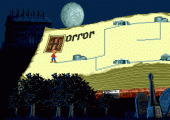
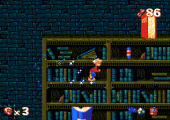
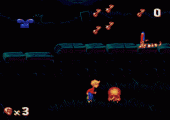
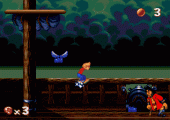



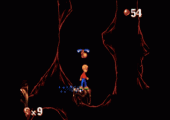
Recent Comments